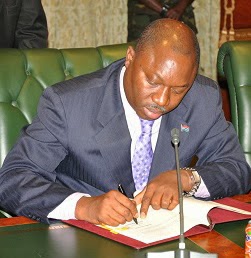Central Bank Governor Buah Saidy said on Thursday the outstanding domestic debt stock has increased to D36.5 billion dalasi (about $713,169,000) as opposed to the D33. 5 billion dalasi (about $ 654,552,000) in the comparative period of 2020.
He was speaking at the quarterly meeting of the Monetary Policy Committee (MPC) of the Central Bank in Banjul on Wednesday.
He said Diaspora remittances continue to be the main source of foreign exchange inflows in the domestic market this year.
“The outstanding domestic debt stock increased to D36.5 billion in the first eight months of 2021 relative to D33.5 billion in the comparative period in 2020. The moderate rate of growth in debt stock was in line with government’s management strategy of reducing debt accumulation,” the Governor said.
On the shortage of dalasi coins in circulation, he rejected the claim from the public that there is shortage of coins in the country
Recently commuters and shoppers were made to believe that the country has run out of coins prompting many commuters and shoppers to have confrontations with apprentices and shopkeepers.
“This information that there are no coins in the country is not true, in fact, I do get calls from people asking me but I always tell them that it is not true. What we have in the vault, and recently we received additional eight million dalasis from Royal Mint, will last for many years,” the Governor assured.
“There is no shortage of coins here but Central Bank cannot go out in the streets giving out coins, people must come and demand for coins. We have the exchange window at the banking hall and if people come and demand for coins they will get it,” he said.
Saidy disclosed that the country has enough stock of currency notes, noting that it is only in the Gambia where people will demand for new notes only to go and toast it to the musicians.
“These notes are very expensive to print because we spend millions of dalasis on printing notes and the responsibility of the central bank is not to put out fresh notes. The responsibility of the central banks is making sure that clean, decent and reusable notes are put out,” Saidy said.
“The Central Bank is too busy to help develop this country; we are in a desperate situation. What we are focusing on is to help this country and Gambians enjoy stable prices, a very stable financial sector with high level of liquidity to invest and improve the quality of lives of the Gambian people. And make sure that the exchange rate in dalasi is at a very good equilibrium, where it is not overvalued to the disadvantage at the level of the Gambians,” he added.





